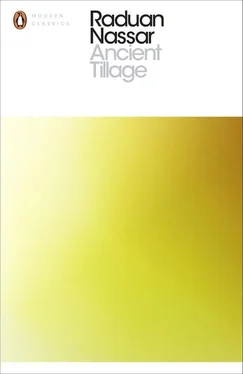Raduan Nassar - Ancient Tillage
Здесь есть возможность читать онлайн «Raduan Nassar - Ancient Tillage» весь текст электронной книги совершенно бесплатно (целиком полную версию без сокращений). В некоторых случаях можно слушать аудио, скачать через торрент в формате fb2 и присутствует краткое содержание. Жанр: Современная проза, на английском языке. Описание произведения, (предисловие) а так же отзывы посетителей доступны на портале библиотеки ЛибКат.
- Название:Ancient Tillage
- Автор:
- Жанр:
- Год:неизвестен
- ISBN:нет данных
- Рейтинг книги:3 / 5. Голосов: 1
-
Избранное:Добавить в избранное
- Отзывы:
-
Ваша оценка:
- 60
- 1
- 2
- 3
- 4
- 5
Ancient Tillage: краткое содержание, описание и аннотация
Предлагаем к чтению аннотацию, описание, краткое содержание или предисловие (зависит от того, что написал сам автор книги «Ancient Tillage»). Если вы не нашли необходимую информацию о книге — напишите в комментариях, мы постараемся отыскать её.
For André, a young man growing up on a farm in Brazil, life consists of 'the earth, the wheat, the bread, our table and our family'. He loves the land, fears his austere, pious father who preaches from the head of the table as if it is a pulpit, and loathes himself, as he starts to harbour shameful feelings for his sister Ana. Lyrical and sensual, told with biblical intensity, this classic Brazilian coming-of-age novel follows André's psychological and sexual awakening, as he must choose between body and soul, duty and freedom.
Ancient Tillage — читать онлайн бесплатно полную книгу (весь текст) целиком
Ниже представлен текст книги, разбитый по страницам. Система сохранения места последней прочитанной страницы, позволяет с удобством читать онлайн бесплатно книгу «Ancient Tillage», без необходимости каждый раз заново искать на чём Вы остановились. Поставьте закладку, и сможете в любой момент перейти на страницу, на которой закончили чтение.
Интервал:
Закладка:
12
(… as I discern the family’s utensils and wardrobe inside that trench, I hear diffused, lost voices, but even so, the transparent water that still gushes from the bottom comes as no surprise; I withdraw into our weariness, into so much exhausting struggle, and from this bundle of routines, one by one, I draw out the sublime bones of our code of manners: all excess forbidden, determination required, and constant speeches decrying waste, condemning it as vice, and ever denouncing it as gravely threatening to our work; I meet up again with the tepid messages conveyed by stern looks and eyebrows, and our most hidden chagrins betrayed through our burning cheeks, and the acid agony of the ensuing, sometimes naked reprimands, and also, the crafts school for boys, extolled as the answer to the store-bought goods we should be making with our own hands, and the even more rigid law proclaiming all of our bread should be worked on the fazenda : we never ate one morsel of bread that was not home-made, and three times a day, as we broke bread, we concluded our ritual of austerity, and it was also at the table, more than anywhere else that, with our heads bowed, we had our lessons in justice.)
13
Once upon a time, there was a starving man. One day, walking by an unusually large dwelling, he asked the people gathered on the front steps who owned the palace. The king of all peoples, the most powerful man in the universe, they answered. The starving man then approached one of the guards posted at the palace gates and asked for alms in the name of God. ‘Where are you from?’ the guards asked. ‘Don’t you know that all you have to do is appear before our lord and master to have everything you desire?’ Encouraged by the response, the starving man, although still somewhat cautious, went through the gates, crossed the spacious patio beyond the entrance, as well as the garden shaded by flourishing trees, and soon he reached the inside of the palace, where he walked through room after room, all of them very large, with tall ceilings but with no furniture whatsoever; managing to find his way through the labyrinth of that strange dwelling, he ended up arriving in a big room covered in flower- and leaf-decorated tiles, which matched pleasantly with the enormous alabaster vase in the middle of the salon spouting fresh, sweetly murmuring water; a velvet carpet embroidered with arabesques covered part of the room where, leaning against some pillows, there was seated an old man with a soft white beard, his face alight with a gentle smile. The starving man approached the old man with the handsome beard, greeting him, ‘May peace be with you!’ ‘And with you, peace, and God’s mercy and blessing!’ answered the old man, leaning slightly forward. ‘What do you desire, poor man?’ ‘Oh, my lord and master, I ask you for alms in the name of God, for I am so needy I may soon keel over from hunger.’ ‘Oh my God!’ exclaimed the old man. ‘Is it possible I find myself in a city where a person can be as hungry as you claim to be? This is intolerable!’ ‘May God bless you and blessed be your saintly mother,’ said the starving man in recognition of the sentiments expressed by the old man. ‘Stay here, poor man, I want to break bread with you and have you serve yourself from the salt of my table.’ The old man then clapped his hands and ordered a young servant boy to bring a jug and a basin. Soon afterwards, he said to the starving man: ‘Guest and friend, come over here and wash your hands.’ Then the old man himself stood up, leaned over the basin and began to rub his hands together grandly under the water supposedly flowing from the invisible jug. The starving man didn’t know what to make of the scene before his eyes and, since the old man insisted, he took two steps forward and also pretended to wash his hands. ‘Set the table! Hurry up!’ the old man ordered the servants, ‘and don’t take too long with our food, this poor man is almost fainting from hunger.’ Several servants began to come and go, as if they were setting the table with a cloth and many dishes. The starving man, doubled over in pain, thought to himself: the poor have to be extremely patient with the whims of the powerful, and he abstained therefore from showing any sign of irritation. ‘Sit here next to me,’ said the old man. ‘And honour me with your presence at my table.’ ‘I hear and I obey,’ said the starving man, sitting down on the carpet next to the old man, before the imaginary table. ‘To my guest, sir, my house is your house and my table is your table. Make yourself at home and eat until you have satisfied your hunger.’ And since the old man encouraged him to join him, the starving man wasted no time and shortly feigned to eat from the supposed plates, to help himself with his fork to hearty chunks of food, and, moving his chin, to chew and swallow the non-existent meal. ‘What do you think of this bread?’ asked the old man. ‘This bread is very pure and good, I’ve never tasted bread like this before in my life,’ the starving man answered promptly, without exaggerating his praise. ‘What a fine guest you are, sir. You make me very happy! But I don’t think I deserve so many compliments, otherwise what will you say about the delicacies on your left, this roasted meat, stuffed with rice and almonds, this fish in sesame sauce, or these lamb chops! And what do you think of the aroma?’ ‘The aroma is as inebriating as the presentation and the flavour are divine.’ ‘I cannot but acknowledge, honourable guest, that you are extremely indulgent regarding my table, and for this very reason, you will now taste an incomparable morsel from my own hand,’ said the old man, pretending to take a morsel of food from the platter with his fingers and lifting it to the starving man’s lips, saying, ‘You must chew carefully!’ The starving man puckered his lips so that the morsel could be put in his mouth, and then chewed it thoroughly, closing his eyes with pleasure to lend more credence to his performance. ‘Excellent!’ he exclaimed upon finishing. ‘My dear guest, from your manner of speaking, I can see that you are a man of taste, accustomed to eating at the tables of the great and royal; eat some more, and may you enjoy it.’ ‘I’m satisfied, I’ve already partaken of all of the dishes, I cannot eat any more,’ said the starving man, smiling in gratitude, and barely containing the pangs of his terrible hunger. The old man clapped his hands and when the servants arrived, he said, ‘You many bring the dessert.’ The young servants bustled about, waving their arms in specific gestures and with certain timing, following with other rapid, precise movements indicating that they were removing one tablecloth and spreading another, even though nothing at all had been changed. Finally, the old man lifted his hand and they withdrew. ‘Let us sweeten ourselves,’ said the old man, somewhat pretentiously. ‘Let us partake of dessert: this pie, bulging with nuts and pomegranates, with a sort of epic air about it, looks very tempting. Try some, dear guest, for it has been cut in your honour. Here is some musk-flavored syrup, perhaps you would like to pour it over your pie … Please eat, eat, do not stand on ceremony.’ And the old man set the example, devouring spoonful upon spoonful, with appetite and finesse, in a perfect performance as if he were savouring real pie. The starving man imitated him skilfully, even though his hunger pangs were worse than ever. ‘Jellies? Fruit? Here are some dried dates, dates in liqueur, raisins … What do you prefer? I prefer dried fruit to candied fruit, it still has its natural flavour. You must also try these figs, fresh off the tree. No? How about some peaches? Perhaps you prefer plums … We have some here, eat up, eat up, God is merciful to all!’ And the starving man, whose mouth, tongue and jaw were tired from pretending to chew, while his stomach cried out ever more loudly, answered the old man’s persistent comments, ‘I’m satisfied, sir, I couldn’t possibly eat another thing!’ ‘That is extraordinary! Considering how hungry you were when you arrived here, dear guest, it is amazing that you have been so quickly satisfied; at any rate, it has been an honour to share my table with you. But we still have not drunk together …’ said the old man, with a slight trace of mockery on his lips. He soon clapped his hands and at this signal, several adolescents, their graceful arms showing through light tunics, came to his aid. They simulated the changing of the tablecloth and the setting of all kinds of glasses and cups upon the table. The host, still carrying on his performance, filled the glasses, offering one to the starving man, who, with this permission, took it amiably and lifted it to his lips. ‘What sublime wine!’ he exclaimed, once again closing his eyes and smacking his lips. And more wine was poured into the glasses, and other supposed wines were brought, of all types and flavours. They alternated taking drinks, surrendering to the unsteady game of the inebriated, slowly swaying their heads and slumping, in addition to engaging in many other antics, until all of the bottles had been tasted. And after having poured so much wine into the glasses, the old man abruptly interrupted the feigned drinking spree, and returning to his former simplicity, his facial expression suddenly austere, he spoke soberly to the starving man with whom he had shared the imaginary meal. ‘Finally, after having searched the world over, I have found a man of strong spirit, firm character and who, above all, has proven to have the most important virtue known to man: patience. For your rare qualities, from now on, you will live in this house, which is so huge and so uninhabited, and you can be certain that you will never lack food on your table.’ In that very instant, the servants brought bread, true, robust bread, and the starving man, thanks to his patience, never knew hunger again.
Читать дальшеИнтервал:
Закладка:
Похожие книги на «Ancient Tillage»
Представляем Вашему вниманию похожие книги на «Ancient Tillage» списком для выбора. Мы отобрали схожую по названию и смыслу литературу в надежде предоставить читателям больше вариантов отыскать новые, интересные, ещё непрочитанные произведения.
Обсуждение, отзывы о книге «Ancient Tillage» и просто собственные мнения читателей. Оставьте ваши комментарии, напишите, что Вы думаете о произведении, его смысле или главных героях. Укажите что конкретно понравилось, а что нет, и почему Вы так считаете.












